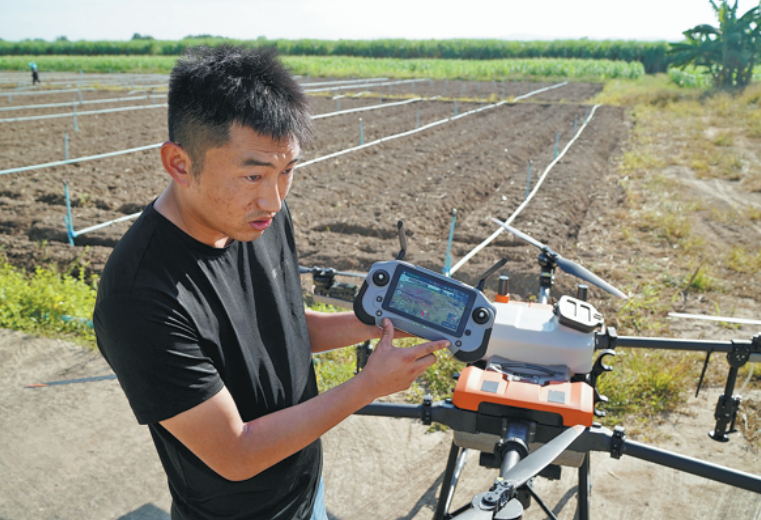
Chen Guangfei, an engineer at Huida Tech, demonstrates the operation of drones on farmland in Kanchanaburi Province, Thailand, earlier this month. (YANG WANLI/CHINA DAILY)
As a major agricultural country in Southeast Asia and a global producer of natural rubber, Thailand is now seeking to transform its pillar sector with help from China's smart farming technology.
In Danmakamtia, a village in Kanchanaburi Province, 50-year-old Somboon Songwainiaw is one of the 30 pioneers benefiting from the technological shift, specifically an autopilot steering system developed by Huida Tech, a Chinese company specializing in smart farming solutions.
Somboon owns more than 22 hectares of farmland, mainly cultivating sugarcane, tomato and cassava. For the past six months, two of his tractors have been equipped with the smart steering system.
Guided by satellite navigation and equipped with sensors, the system allows tractors to operate autonomously along predefined routes tailored to specific crops and varying field conditions. It achieves a field accuracy of 1.5 centimeters.
"Farm work is highly dependent on seasons and weather," Somboon said. "During the harvest or planting season, bigger farms usually suffer from the shortage of hands, and hiring workers can be expensive. For plowing, it costs around 1,600 baht ($47) per rai (1,600 square meters)."
The introduction of the autopilot steering system has helped him cut costs to 200 baht per rai.
The system features an autopilot system for precise operations, an automatic land leveling system and a monitoring capability to analyze job performance. It can be equipped on agricultural machinery beyond just tractors.
"The system can lead tractors or other machinery to achieve automatic operation," said Liang Fei, sales director of Huida Tech in the Asia-Pacific region.
"Also, it can be operated at night, as the route is well-designed and guided by sensors instead of human vision."
Since its establishment in 2009 in Heilongjiang province, Northeast China, the company has delivered more than 35,000 autopilot steering systems, covering a total of 20.23 million hectares of farmland worldwide, including in Brazil, Laos, Mexico, South Korea, Turkiye and Vietnam.
It has also developed key components to optimize spraying and spreading systems, making them adaptable to a wider range of agricultural scenarios. Its intelligent water-saving irrigation systems and agricultural drones are being piloted in Thailand and Vietnam.
Great potential
"The region enjoys advantages and great potential to develop smart agriculture, as it is the world's major production base of rice, sugarcane and also tropical fruits," Liang said.
"Taking drones for example, they can significantly improve the efficiency of spraying pesticides and fertilizers in hot weather and mountainous areas."
According to the Thailand Board of Investment, about 43 percent of the kingdom's total land area is used for agriculture. The sector generates $41.2 billion annually, contributing 8 percent to the country's GDP. There are about 12 million farmers in Thailand, indicating considerable opportunities for further development in agriculture.
Thailand now has about 5,000 drones monitoring 4 million rai of land across the country, local media reported. In October, Deputy Prime Minister and Digital Economy and Society Minister Prasert Jantararuangtong announced that the country is ready to support efforts aimed at boosting farmers' access to drones.
"Drones are my next target," said Somboon, the farmer. "Their high efficiency is very impressive."
With a 360-degree rotating radar, the drones designed by Huida can autonomously avoid obstacles, said Chen Guangfei, an engineer at the company.
"In just four hours, it can complete spraying about 40 hectares. And the operation is very easy. Based on our experience, even farmers around the age of 50 can operate it themselves after a two-day training course."
Huida's CEO Zhang Yu said the company plans to establish an innovation center in Thailand within the next two years. It aims to provide local farmers with comprehensive smart farming solutions, fostering a sustainable agricultural ecosystem through scientific planning, intelligent management and large-scale production.
"We are committed to driving the agricultural industry forward, creating a more prosperous and sustainable future for farmers and agricultural producers, and contributing to food security and environmental protection in the region as well as the world," he said.
Over the past year, several economists, including those from the World Bank and the International Monetary Fund, have urged Thailand to focus on reforming the country's structural and human capital development amid climate change, which has resulted in reduced rainfall and other weather problems that pose risks to agriculture.
In July, Peeraphan Korthong, director-general of Thailand's Department of Agricultural Extension, highlighted the critical role of science and technology in addressing these climate change challenges during an interview with local news outlet The Nation.
"Thailand should take action on digitization and technology to boost competitiveness and keep up with the global move toward a digital and low-carbon economy," Peeraphan said. Young farmers should be able to access training, technology and cost mitigation to raise their productivity and discipline, he added.